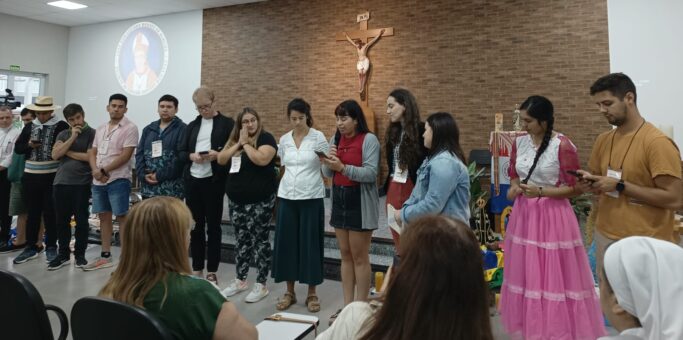
May 10, 2023 | Non categorizzato
The Regional Assemblies of the continental phase of the 2021-2024 Synod concluded with the Assembly of the Southern Cone, held in Brasilia in March 2023. Here we share some reflections on this “journey” from members of the Focolare Movement who participated in the concluding Assembly. 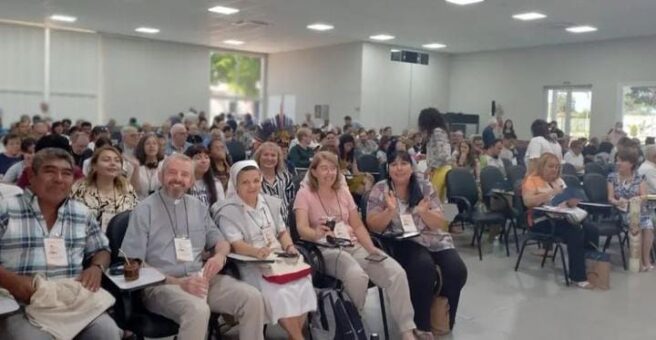 “From the moment I heard that I had been elected to participate, I felt a great joy but also the responsibility to be a true channel through which the Holy Spirit can pass.” This is what Mercedes Isola, a volunteer of the Focolare Movement, said. She was elected by the Bishops in the region of La Plata, Argentina, to be a lay participant in the Continental Assembly for the Synod of the Southern Cone that took place in Brasilia, Brazil, at the headquarters of the CNBB (National Conference of Bishops of Brazil). Mercedes continues, “There was very deep sharing among us and we rediscovered our baptismal dignity that makes us all sisters and brothers, people of God, co-responsible in mission, regardless of vocation. The ‘discernment communities’, made up of people from different experiences and vocations, were a confirmation of this reality: the Holy Spirit is at work in everyone, without distinction.”
“From the moment I heard that I had been elected to participate, I felt a great joy but also the responsibility to be a true channel through which the Holy Spirit can pass.” This is what Mercedes Isola, a volunteer of the Focolare Movement, said. She was elected by the Bishops in the region of La Plata, Argentina, to be a lay participant in the Continental Assembly for the Synod of the Southern Cone that took place in Brasilia, Brazil, at the headquarters of the CNBB (National Conference of Bishops of Brazil). Mercedes continues, “There was very deep sharing among us and we rediscovered our baptismal dignity that makes us all sisters and brothers, people of God, co-responsible in mission, regardless of vocation. The ‘discernment communities’, made up of people from different experiences and vocations, were a confirmation of this reality: the Holy Spirit is at work in everyone, without distinction.” 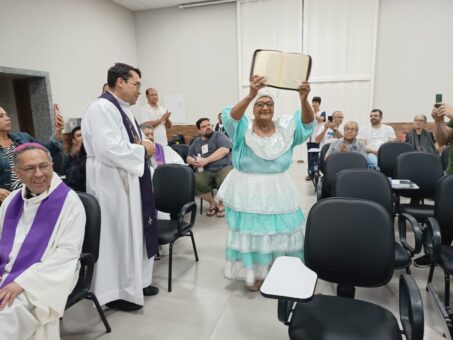 The meeting was attended by more than 200 people. It began with a procession of images of the Virgin Mary, patroness of each country, to whom the work of this Assembly was entrusted. Brazilians, Chileans, Uruguayans, Argentinians and Paraguayans were brought together. It was apparent that amid the diversity of each people, the individual in dialogue with others becomes a builder of true synodality. “Being open to a Church with greater lay participation, a Church that is inclusive, transparent, and consistent in following Jesus and is concrete in its service and mission,” are just some of the points that were addressed and deepened during the Assembly. Eliane de Carli, a married focolarina from Brazil, tells us. “This experience based upon a practice known as ‘spiritual conversion’, ensured there was very deep communion in the working groups. In addition, the richness of this internationality allowed us to get to know the challenges of the Church in each country, some of them very similar.”
The meeting was attended by more than 200 people. It began with a procession of images of the Virgin Mary, patroness of each country, to whom the work of this Assembly was entrusted. Brazilians, Chileans, Uruguayans, Argentinians and Paraguayans were brought together. It was apparent that amid the diversity of each people, the individual in dialogue with others becomes a builder of true synodality. “Being open to a Church with greater lay participation, a Church that is inclusive, transparent, and consistent in following Jesus and is concrete in its service and mission,” are just some of the points that were addressed and deepened during the Assembly. Eliane de Carli, a married focolarina from Brazil, tells us. “This experience based upon a practice known as ‘spiritual conversion’, ensured there was very deep communion in the working groups. In addition, the richness of this internationality allowed us to get to know the challenges of the Church in each country, some of them very similar.” 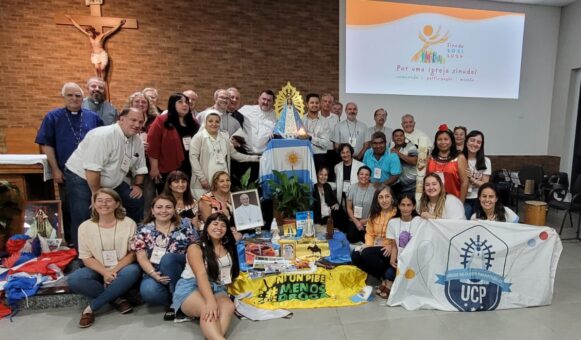 A week of intense work turned into a life experience. This can be seen in what Marise Braga, a Brazilian focolarina, said: “The day began with a short prayer led by each country in turn. The group drafted a final document on the basis of the questionnaires collected in the various countries during the local phase. They answered three questions, highlighting the lights and positive elements that emerged from those reports, highlighting the shadows, tensions and challenges of certain issues in each country, and finally, recognising the priorities to be addressed in the Synod.” The role of women in the Church was one of the recurring themes during this Continental Assembly in the Southern Cone. This is an issue that is gaining importance and, along with engagement with young people, needs to be addressed. “Before the concluding Mass of this synodal phase, the young people asked to speak,” said Mercedes Isola. “It was very powerful to hear from them why their friends are no longer in the Church. The young people themselves asked for greater openness, a Church that allows all God’s people to be protagonists, with open doors as Pope Francis says.”
A week of intense work turned into a life experience. This can be seen in what Marise Braga, a Brazilian focolarina, said: “The day began with a short prayer led by each country in turn. The group drafted a final document on the basis of the questionnaires collected in the various countries during the local phase. They answered three questions, highlighting the lights and positive elements that emerged from those reports, highlighting the shadows, tensions and challenges of certain issues in each country, and finally, recognising the priorities to be addressed in the Synod.” The role of women in the Church was one of the recurring themes during this Continental Assembly in the Southern Cone. This is an issue that is gaining importance and, along with engagement with young people, needs to be addressed. “Before the concluding Mass of this synodal phase, the young people asked to speak,” said Mercedes Isola. “It was very powerful to hear from them why their friends are no longer in the Church. The young people themselves asked for greater openness, a Church that allows all God’s people to be protagonists, with open doors as Pope Francis says.” Father Pedro Brassesco, Assistant Secretary of CELAM (Latin American and Caribbean Episcopal Council) said that these needs unite all the continents and will push us to “learn a new way of being Church.” “The Church has called us together and is listening to us,” Marise concluded, ‘not only the Bishops, but all the people of God. We often need to invert the pyramid to know what is at the bottom, but patience is needed to see the fruits of this work. Perhaps our children, grandchildren and great-grandchildren will enjoy it. We are now planting a seed, but we must have hope. It is a first step, towards a Church that is closer to us all.”
Father Pedro Brassesco, Assistant Secretary of CELAM (Latin American and Caribbean Episcopal Council) said that these needs unite all the continents and will push us to “learn a new way of being Church.” “The Church has called us together and is listening to us,” Marise concluded, ‘not only the Bishops, but all the people of God. We often need to invert the pyramid to know what is at the bottom, but patience is needed to see the fruits of this work. Perhaps our children, grandchildren and great-grandchildren will enjoy it. We are now planting a seed, but we must have hope. It is a first step, towards a Church that is closer to us all.”
Maria Grazia Berretta
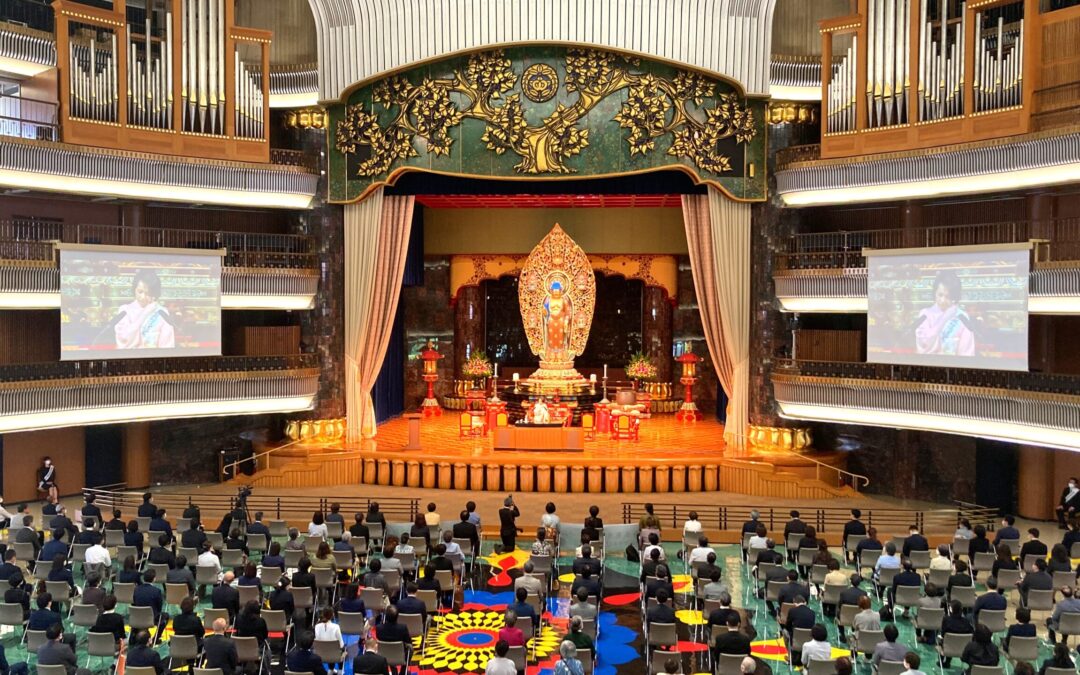
May 4, 2023 | Non categorizzato
The journey in Asia and Oceania of Margaret Karram and Jesús Morán, President and Co-President of the Focolare Movement, continues towards the Fiji Islands after concluding the second stage on Japanese land. Here you find some updates on their stay in Japan. ありがとう Arigato Thank you 思いやり Omoiyari Care for others 健康 Kenko Health 平和 Heiwa Peace 美しさ Utsukushisa Beauty 正直 Shojiki” Honesty According to a survey by the Japanese national TV NHK, these six words are the ones Japanese people love most. They well describe the soul of this people and the value they place on harmony in social life and with nature. Margaret Karram and Jesús Morán, President and Co-President of the Focolare Movement, with the Focolare Centre’s delegation immersed themselves in the very rich culture of Japan for the second stage of their journey to East Asia, from 25 April to 2 May 2023. The Church in Japan: recreating community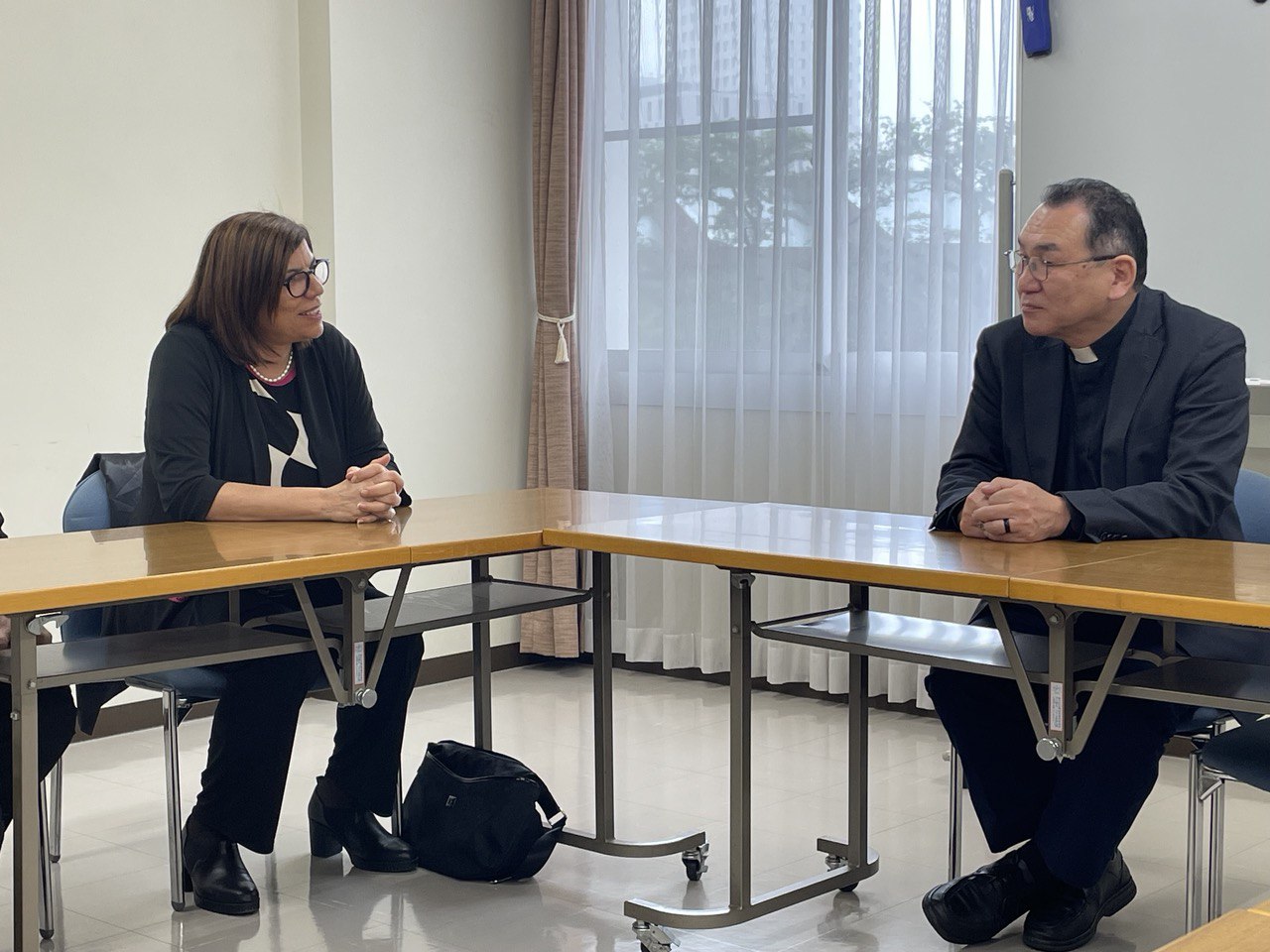 The doors to the “Land of the Rising Sun” were opened to them by the Archbishop of Tokyo, Archbishop Tarcisius Isao Kikuchi. He described the local Catholic Church as “small and silent”. There are 536,000 Christians who form 0.4% out of a population of 130 million where Buddhism and Shintoism are the majority religions. It is difficult to know which is the main one, since many Japanese follow both, and so there is a tendency to bring together different aspects of various religions. He explained that the current lifestyle is leading to a disintegration of the family, and this causes people to feel lonely and cut off. “There is a need to recreate community,” he said, “and the Focolare can help the Church do this. I encourage you to make your spirituality known to the bishops first (there are sixteen in Japan), so that through them it reaches the communities’.
The doors to the “Land of the Rising Sun” were opened to them by the Archbishop of Tokyo, Archbishop Tarcisius Isao Kikuchi. He described the local Catholic Church as “small and silent”. There are 536,000 Christians who form 0.4% out of a population of 130 million where Buddhism and Shintoism are the majority religions. It is difficult to know which is the main one, since many Japanese follow both, and so there is a tendency to bring together different aspects of various religions. He explained that the current lifestyle is leading to a disintegration of the family, and this causes people to feel lonely and cut off. “There is a need to recreate community,” he said, “and the Focolare can help the Church do this. I encourage you to make your spirituality known to the bishops first (there are sixteen in Japan), so that through them it reaches the communities’. 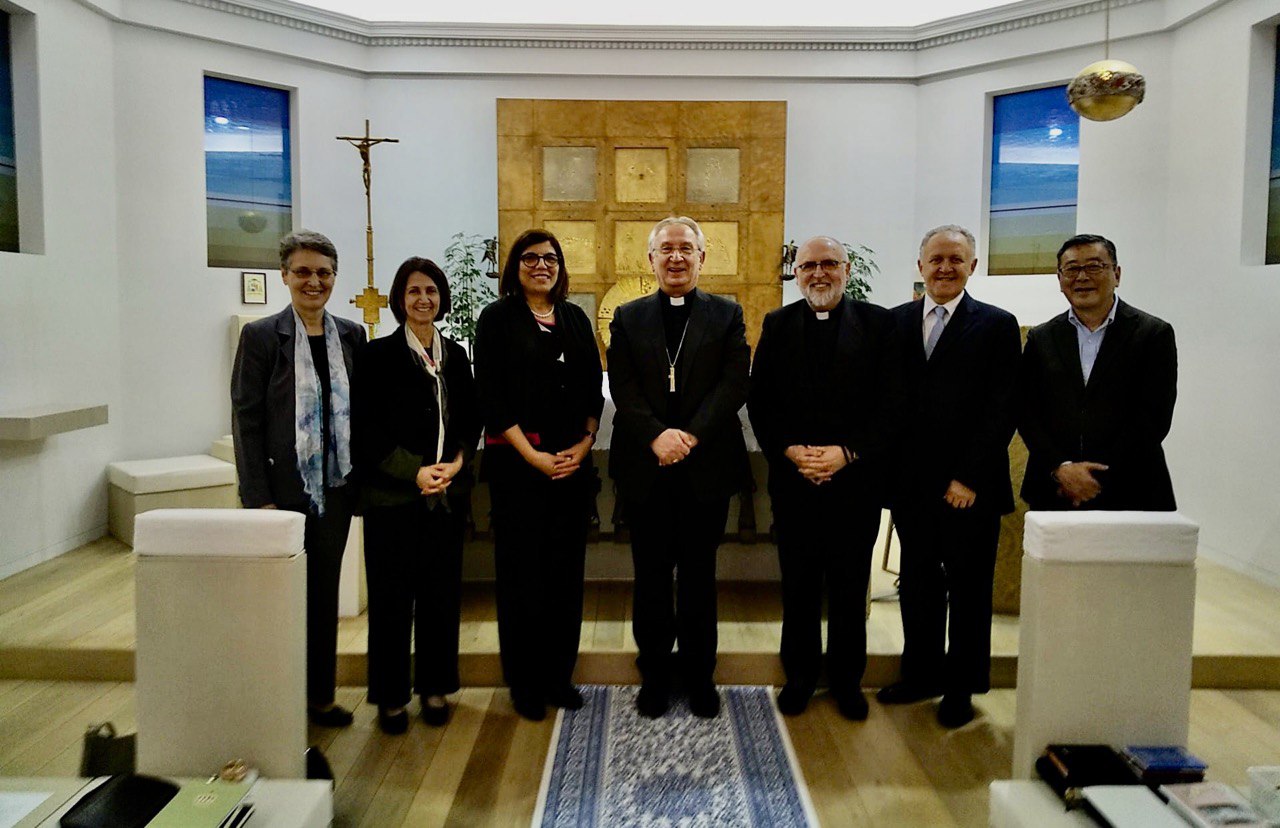 The conversation continued during the visit to Archbishop Leo Boccardi, Apostolic Nuncio in Tokyo. Christians are only 2% of the population of Asia. So, what is their role? The Nuncio too encouraged the Focolare to spread the charism of fraternity. “In Japan there is order and respect among people,” he explained, “but there is also a lot of indifference. The pandemic has left an open wound: we must rebuild relationships”. “I have seen a church being born,” Igino Giordani (Foco) wrote as early as 1959. He perceived the sacredness of this country’s Christian history when he went to Tokyo at the invitation of the Canossian Sisters. He was the one who sowed the first seeds of the spirituality of unity in this country. The focolares only arrived in 1976 and ’77 and today there are three, located in Tokyo and Nagasaki. The community numbers about a thousand people scattered over the five main islands of the Japanese archipelago. Living between modernity, tradition, and a thirst for spirituality Eight days, however, are not enough to get to know the soul of a people in depth. For Margaret Karram and Jesús Morán, every meeting and conversation was precious, as was the visit to significant places in Tokyo such as the Shintoist Menji Jingu Shrine or the ultra-modern district of Shimbuya. This is how Japan expresses its great variety: it is one of the most highly developed countries in the world yet is firmly bound to tradition. Society is very homogeneous and fosters the common good over that of the individual. This people has great sensitivity, gentleness, and pays attention to others, as well as a great capacity for work and a sense of duty.
The conversation continued during the visit to Archbishop Leo Boccardi, Apostolic Nuncio in Tokyo. Christians are only 2% of the population of Asia. So, what is their role? The Nuncio too encouraged the Focolare to spread the charism of fraternity. “In Japan there is order and respect among people,” he explained, “but there is also a lot of indifference. The pandemic has left an open wound: we must rebuild relationships”. “I have seen a church being born,” Igino Giordani (Foco) wrote as early as 1959. He perceived the sacredness of this country’s Christian history when he went to Tokyo at the invitation of the Canossian Sisters. He was the one who sowed the first seeds of the spirituality of unity in this country. The focolares only arrived in 1976 and ’77 and today there are three, located in Tokyo and Nagasaki. The community numbers about a thousand people scattered over the five main islands of the Japanese archipelago. Living between modernity, tradition, and a thirst for spirituality Eight days, however, are not enough to get to know the soul of a people in depth. For Margaret Karram and Jesús Morán, every meeting and conversation was precious, as was the visit to significant places in Tokyo such as the Shintoist Menji Jingu Shrine or the ultra-modern district of Shimbuya. This is how Japan expresses its great variety: it is one of the most highly developed countries in the world yet is firmly bound to tradition. Society is very homogeneous and fosters the common good over that of the individual. This people has great sensitivity, gentleness, and pays attention to others, as well as a great capacity for work and a sense of duty. 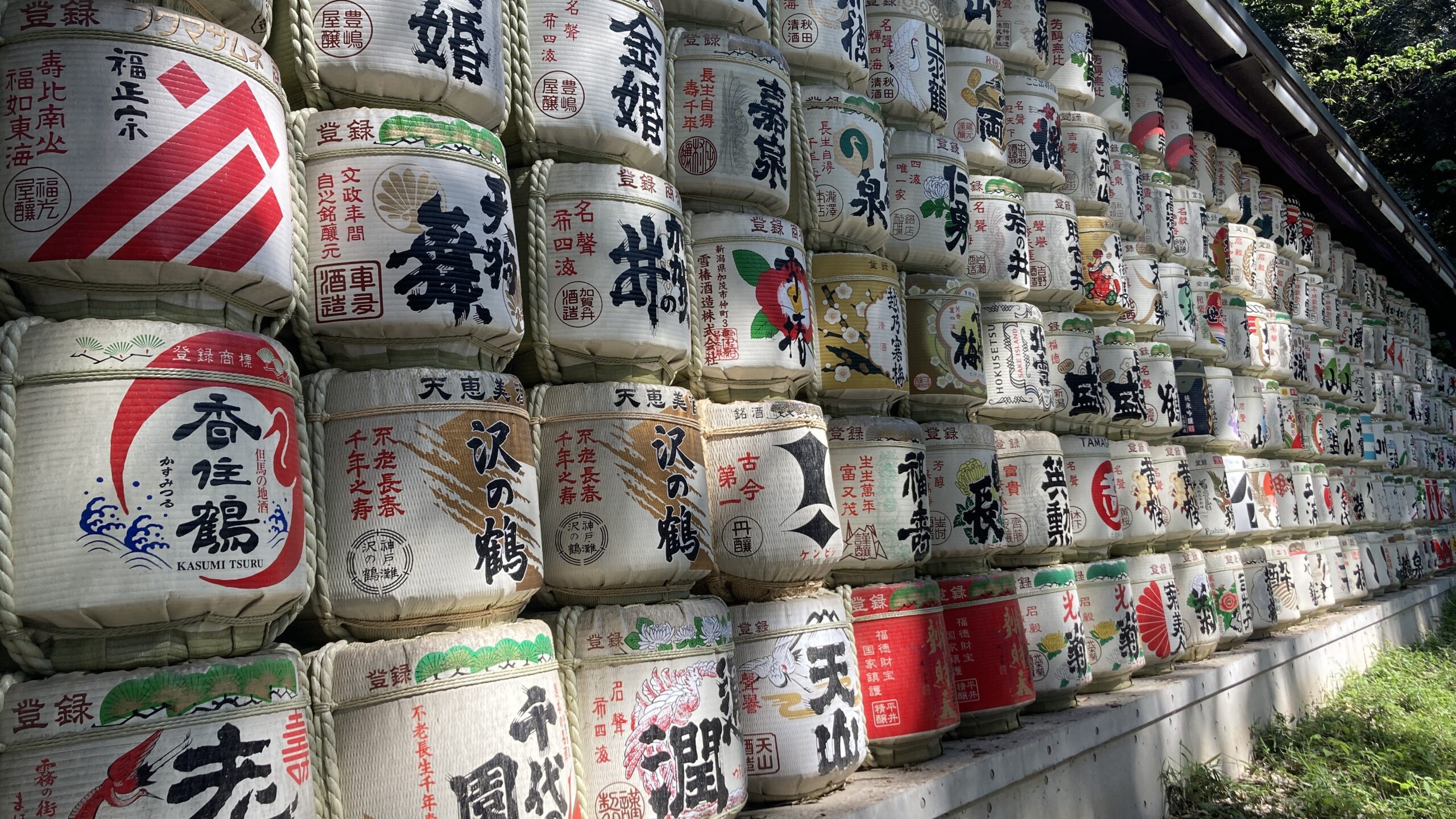 The Japanese are guided by the ‘feeling of the heart’ that knows how to grasp what is essential from concrete facts. And it is significant that the first meeting President and Co-President of the Focolare had was with the young people of the Movement, the Gen. They shared with one another in a harmonious atmosphere of simplicity and family. There was the same depth of relationship and sharing in their meetings with the focolarini and volunteers. Jesuits and Focolare together, a sign of hope for the world On 29 April, the Catholic university in Tokyo, Sophia University, hosted the eagerly awaited symposium “Can we be a sign of hope for the world?”, to which Margaret Karram and Jesús Morán were invited as speakers. The seminar offered an exceptional opportunity for dialogue between two charisms: the ‘historical’ one of St Ignatius, which brought Christianity to Japan in the 16th century, and the charism of Chiara Lubich. The focus was on the subjects of dialogue and unity in a social and religious context which is thirsting for spirituality. The other speakers were Fathers Renzo De Luca, the Jesuit provincial in Japan, Augustine Sali and Juan Haidar, lecturers at the university. The potential of this synergy emerged clearly from the talks. Margaret Karram began by saying that hope is what humanity needs most and it can be found if we engage in dialogue, even with those who are very different from us, without ever wearying. And she concluded: ‘The small and large efforts towards dialogue that each one of us can make, in building heartfelt and warm relationships, are the solid foundation on which to build a more fraternal world’. Fr De Luca explained how dialogue has been part of the DNA of Japanese Christians since the beginning. “During the persecutions, they did not reciprocate the violence they received with more violence, which is why the Popes have presented them to the world as a model”. Fr Sali reflected on the challenges of the Japanese Church in the face of secularisation, a church which must find new pathways for dialogue to offer Christian spirituality to people everywhere. In his talk, Jesús Morán explained that the Synodal path, that the Catholic Church is taking, can be an answer, but only if it is animated by communion-fellowship. “Communion and synodality naturally lead to a new encouragement to dialogue, which is increasingly necessary given the growing polarisation of societies at all levels”. Fr Haidar returned to the theme of hope and assured all present that “We have no reason to lose hope, because good is stronger than evil and God is always on the side of those who do good”. One of the symposium participants defined this shared reflection by Jesuits and the Focolare, as a “chemical reaction” that can produce new life. “I realised that dialogue requires courage, perseverance and patience; above all, I have to start doing it myself”.
The Japanese are guided by the ‘feeling of the heart’ that knows how to grasp what is essential from concrete facts. And it is significant that the first meeting President and Co-President of the Focolare had was with the young people of the Movement, the Gen. They shared with one another in a harmonious atmosphere of simplicity and family. There was the same depth of relationship and sharing in their meetings with the focolarini and volunteers. Jesuits and Focolare together, a sign of hope for the world On 29 April, the Catholic university in Tokyo, Sophia University, hosted the eagerly awaited symposium “Can we be a sign of hope for the world?”, to which Margaret Karram and Jesús Morán were invited as speakers. The seminar offered an exceptional opportunity for dialogue between two charisms: the ‘historical’ one of St Ignatius, which brought Christianity to Japan in the 16th century, and the charism of Chiara Lubich. The focus was on the subjects of dialogue and unity in a social and religious context which is thirsting for spirituality. The other speakers were Fathers Renzo De Luca, the Jesuit provincial in Japan, Augustine Sali and Juan Haidar, lecturers at the university. The potential of this synergy emerged clearly from the talks. Margaret Karram began by saying that hope is what humanity needs most and it can be found if we engage in dialogue, even with those who are very different from us, without ever wearying. And she concluded: ‘The small and large efforts towards dialogue that each one of us can make, in building heartfelt and warm relationships, are the solid foundation on which to build a more fraternal world’. Fr De Luca explained how dialogue has been part of the DNA of Japanese Christians since the beginning. “During the persecutions, they did not reciprocate the violence they received with more violence, which is why the Popes have presented them to the world as a model”. Fr Sali reflected on the challenges of the Japanese Church in the face of secularisation, a church which must find new pathways for dialogue to offer Christian spirituality to people everywhere. In his talk, Jesús Morán explained that the Synodal path, that the Catholic Church is taking, can be an answer, but only if it is animated by communion-fellowship. “Communion and synodality naturally lead to a new encouragement to dialogue, which is increasingly necessary given the growing polarisation of societies at all levels”. Fr Haidar returned to the theme of hope and assured all present that “We have no reason to lose hope, because good is stronger than evil and God is always on the side of those who do good”. One of the symposium participants defined this shared reflection by Jesuits and the Focolare, as a “chemical reaction” that can produce new life. “I realised that dialogue requires courage, perseverance and patience; above all, I have to start doing it myself”. 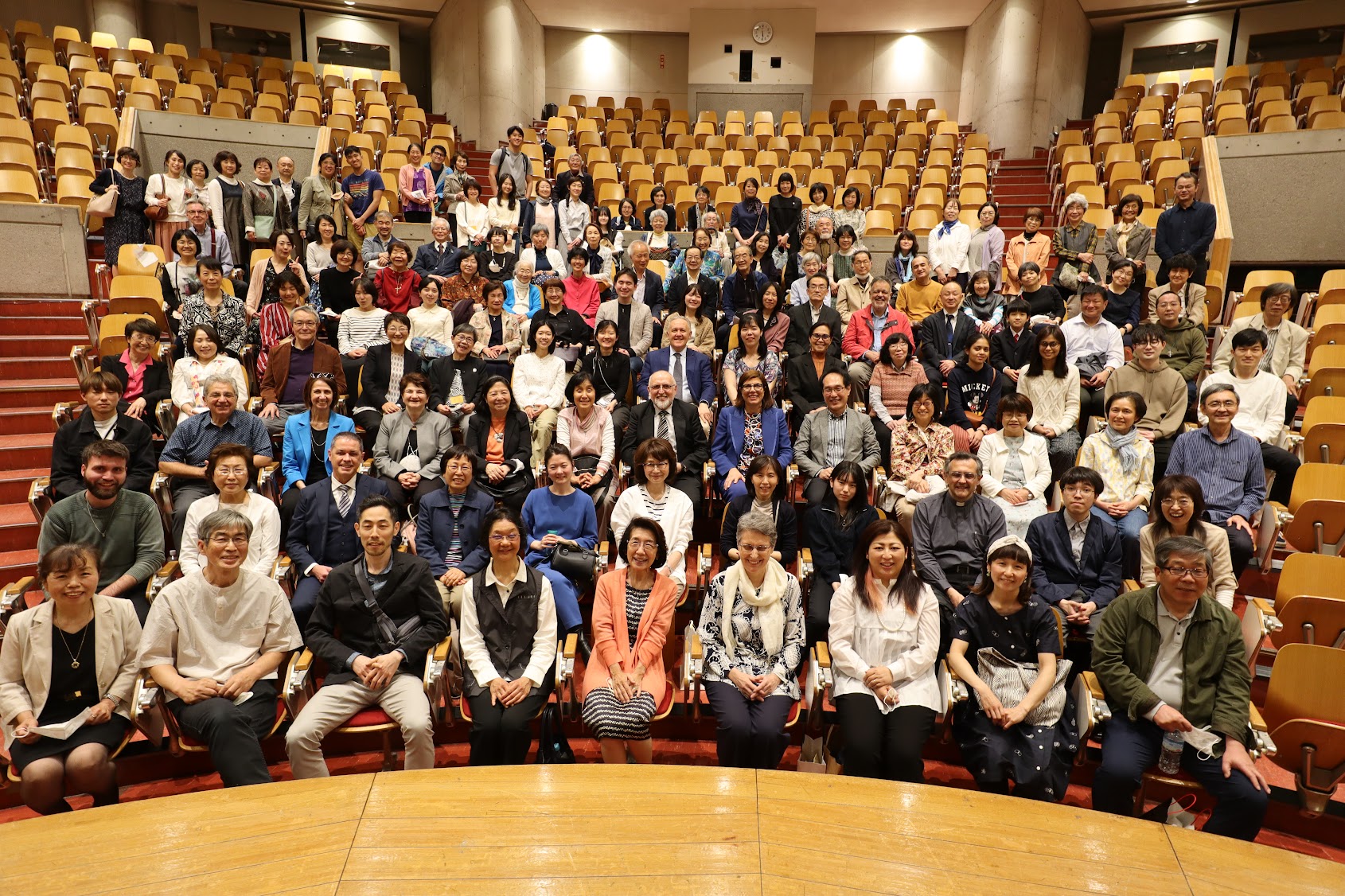 “Open your hearts to everyone”, Margaret Karram’s message for the Focolare community “We are here because we want to share what we have received as a gift from God,” said Natzumi and Masaki at the start of the meeting with the Focolare community in Japan that same afternoon. There was joy and emotion in being together in person for the first time in almost three and a half years, after the pandemic. The experiences shared spoke of great faithfulness in living the Gospel in daily life in a social context that is often hostile, due to indifference or social distance. One volunteer touched on a challenging issue for all Christians in Japan: the difficulty in handing on the faith, especially to the younger generations. “If you live the Word,” Jesús Morán replied, “you can be sure that you are giving Jesus. Usually we want to see results, but Jesus is not interested in this because He wants to touch people with His life. Let us give Him everything, then He will reap what He wants and how He wants”. “Do you have a message for the Focolare community in Japan?” This was the last question that came as a surprise for President and Co-President: “The message is dialogue,” Margaret Karram replied. “I encourage you to have a new openness of heart towards everyone. It is true that Christians are a minority here, but our vocation, as members of Focolare, is to go out to others, courageously, and to open up new paths that can help build fraternity and a peaceful world’. Jesús went on: “Our specific lifestyle is to live unity and so each one of us is fully in our vocation. We are a ‘sacrament of God’s love’ for others, as Chiara Lubich says. May no one feel alone, but go forward together, because faith is lived together’. Visiting the Rissho Kosei-kai: we are one family On 1 May, 42 years after Chiara Lubich’s visit, Margaret Karram and the Focolare delegation accompanying her, entered the large sacred hall of the Rissho Kosei-kai (RKK) Centre. It is difficult to describe the joy and emotion, visible on everyone’s faces: it was like an embrace between brothers and sisters who have been journeying together for many years. This warmth was expressed by President Nichiko Niwano and his daughter Kosho.
“Open your hearts to everyone”, Margaret Karram’s message for the Focolare community “We are here because we want to share what we have received as a gift from God,” said Natzumi and Masaki at the start of the meeting with the Focolare community in Japan that same afternoon. There was joy and emotion in being together in person for the first time in almost three and a half years, after the pandemic. The experiences shared spoke of great faithfulness in living the Gospel in daily life in a social context that is often hostile, due to indifference or social distance. One volunteer touched on a challenging issue for all Christians in Japan: the difficulty in handing on the faith, especially to the younger generations. “If you live the Word,” Jesús Morán replied, “you can be sure that you are giving Jesus. Usually we want to see results, but Jesus is not interested in this because He wants to touch people with His life. Let us give Him everything, then He will reap what He wants and how He wants”. “Do you have a message for the Focolare community in Japan?” This was the last question that came as a surprise for President and Co-President: “The message is dialogue,” Margaret Karram replied. “I encourage you to have a new openness of heart towards everyone. It is true that Christians are a minority here, but our vocation, as members of Focolare, is to go out to others, courageously, and to open up new paths that can help build fraternity and a peaceful world’. Jesús went on: “Our specific lifestyle is to live unity and so each one of us is fully in our vocation. We are a ‘sacrament of God’s love’ for others, as Chiara Lubich says. May no one feel alone, but go forward together, because faith is lived together’. Visiting the Rissho Kosei-kai: we are one family On 1 May, 42 years after Chiara Lubich’s visit, Margaret Karram and the Focolare delegation accompanying her, entered the large sacred hall of the Rissho Kosei-kai (RKK) Centre. It is difficult to describe the joy and emotion, visible on everyone’s faces: it was like an embrace between brothers and sisters who have been journeying together for many years. This warmth was expressed by President Nichiko Niwano and his daughter Kosho. 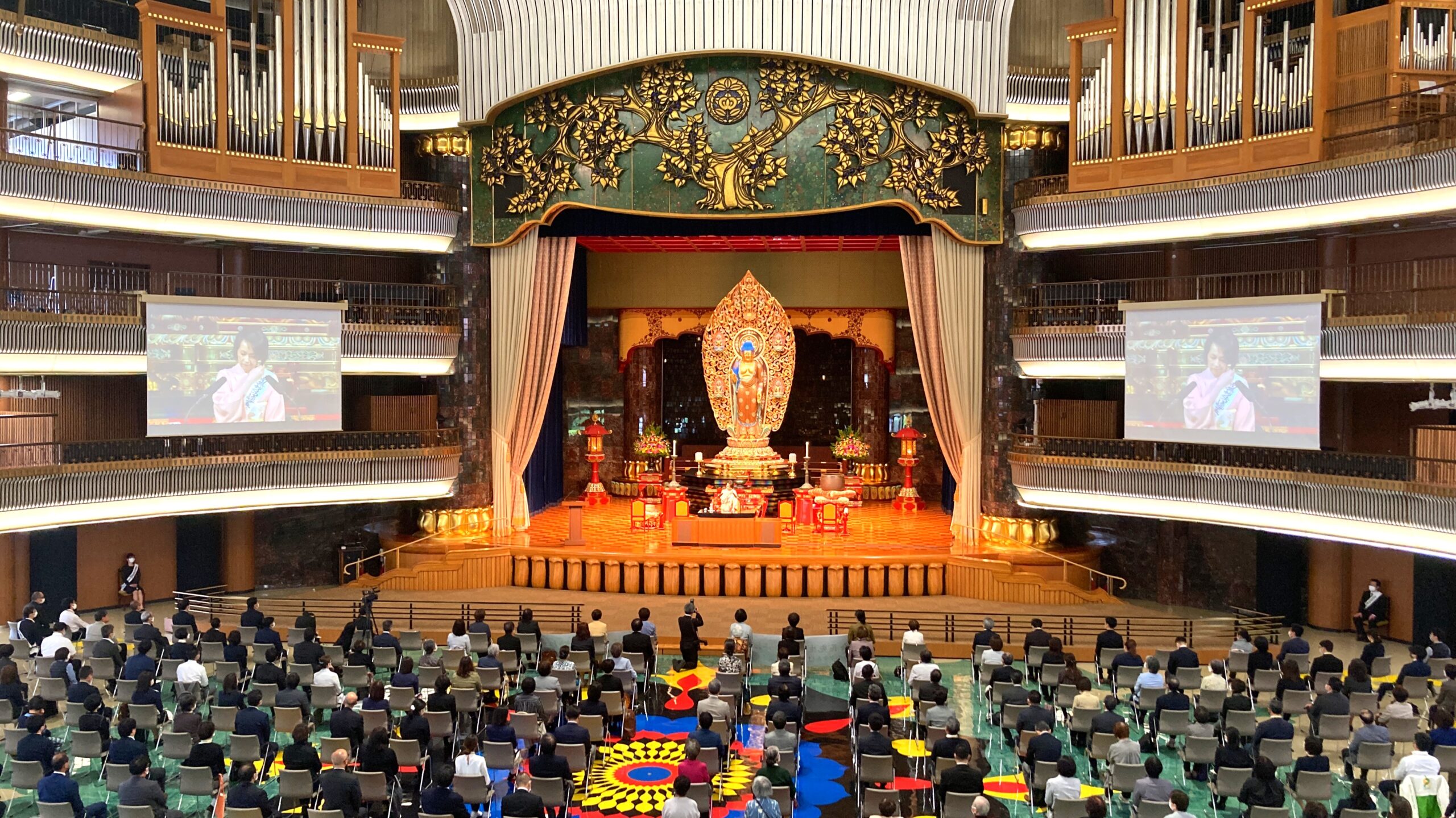 The Rissho Kosei-kai is a lay Buddhist movement founded in 1938 by the Reverend Nikkyo Niwano. It has about one million followers in Japan, and centres in several countries. It is very active in promoting peace and well-being through humanitarian and cooperative action. In 1979 Nikkyo Niwano met Chiara for the first time. Speaking of her he said, “I have met an extraordinary person with whom I can live in fellowship.” Since then, the relationship between the two movements has never been interrupted. ‘Today we are here as one big family,’ Margaret Karram said in her greeting to the many people present and those following the ceremony online, ‘What all humanity holds most dear is the supreme value of peace. (…). Together we can be a sign of hope in the world; together, as one family, our two Movements can be like small lights shining in society, living compassion and love, which are our most powerful weapons”. Nichiko Niwano responded saying, “Today is a day we will not forget; it is a day to be grateful for because our movements are meeting together. We are like members of one family, and we have so much in common. “It is the dialogue between us that makes this happen,” continued his daughter Kosho, who in the future will succeed to the RKK presidency, “I thank my grandfather Nikkyo Niwano who made dialogue and meeting others the foundation of my life. “We experienced a morning of recollection and sacredness,” Margaret Karram concluded, “and I am bringing with me what I have learnt thanks to you: to always be grateful for what I receive as a gift. I renew the Focolare’s commitment to go forward together to fulfil the dream of a better world”.
The Rissho Kosei-kai is a lay Buddhist movement founded in 1938 by the Reverend Nikkyo Niwano. It has about one million followers in Japan, and centres in several countries. It is very active in promoting peace and well-being through humanitarian and cooperative action. In 1979 Nikkyo Niwano met Chiara for the first time. Speaking of her he said, “I have met an extraordinary person with whom I can live in fellowship.” Since then, the relationship between the two movements has never been interrupted. ‘Today we are here as one big family,’ Margaret Karram said in her greeting to the many people present and those following the ceremony online, ‘What all humanity holds most dear is the supreme value of peace. (…). Together we can be a sign of hope in the world; together, as one family, our two Movements can be like small lights shining in society, living compassion and love, which are our most powerful weapons”. Nichiko Niwano responded saying, “Today is a day we will not forget; it is a day to be grateful for because our movements are meeting together. We are like members of one family, and we have so much in common. “It is the dialogue between us that makes this happen,” continued his daughter Kosho, who in the future will succeed to the RKK presidency, “I thank my grandfather Nikkyo Niwano who made dialogue and meeting others the foundation of my life. “We experienced a morning of recollection and sacredness,” Margaret Karram concluded, “and I am bringing with me what I have learnt thanks to you: to always be grateful for what I receive as a gift. I renew the Focolare’s commitment to go forward together to fulfil the dream of a better world”.
Stefania Tanesini
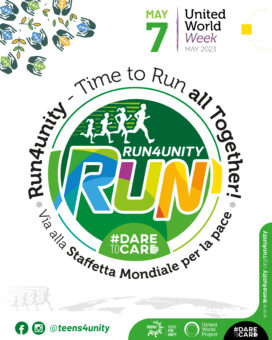
Apr 30, 2023 | Non categorizzato
The 28th United World Week will take place from 1st-7th May 2023. It is a worldwide extravaganza of actions and initiatives to promote fraternity, unity and peace between people and peoples, organized by the communities of the Focolare Movement across the globe. The week opens on 1st May with a live transmission on YouTube from Loppiano, the international little town of the Focolare in Italy. The conclusion will be on 7th May with the worldwide relay race “Run4Unity”, supported and promoted by the Laudato Sì Action Platform of the Holy See’s Dicastery for Promoting Integral Human Development. A community in Pont-à-Mousson (France) will convert the sport and the kilometres completed into trees to be planted in their sister parish in Burkina Faso. And in Bobo Dioulasso in Burkina Faso, the Youth for a United World of the Sahel will go through the streets of the city, to collect plastic, with which they will build a symbolic “mountain of peace”. In St. Mauro Pascoli (Italy), children and adults, will promote ecological sports to raise awareness of environmental care and raise funds to provide sports equipment to young cyclists in Ukraine. In Palawan (Philippines), hundreds of people will clean public beaches to care for nature and for the health of their fellow citizens. They say, “We believe that today, more than ever, unity and fraternity can only be achieved if we take care of ourselves, if we take responsibility to look after the planet together, with concrete actions, starting wherever we are”. From Paraguay to India, through Togo, Benin, and Lebanon to Australia, there are hundreds of initiatives like these, small and large. They take place every year to celebrate United World Week: Seven days of workshops and exhibitions, promoted by the communities of the Focolare Movement throughout the world, in synergy with other movements, associations and local institutions that share its values, to raise public awareness of peace, care for the environment, ecological conversion and integral care of the person which all starts from living out concrete fraternity. The main theme of the 28th United World Week is care of humanity and of the planet: “Dare to Care: People, Planet and Our Ecological Conversion”. These issues are even more urgent in the times in which we live which suffer from the catastrophic effects of the climate crisis and the proliferation of inhumane hotbeds of war and conflict everywhere on the planet. During this week, the initiatives that are ongoing throughout the year, will be showcased in many virtual and in person appointments, different depending on the places and communities that promote them: exhibitions, cultural events, workshops of dialogue and debate, solidarity and ecological actions, sporting events. Locally we aim to influence the public opinion of our countries while internationally, the objective is to fill our Common Home with hope, starting by recognizing the persevering and tireless action of people who are committed to building fraternity. The main partner of the United World Week 2023 is the Laudato Sì Movement. The United World Week is co-funded by the European Union through the AFR.E.SH project.
International events of the United World Week
On 30th April, at 21.00 (Italian time), the United World Week will begin with a concert entitled “The reason we care”, given by the international band Gen Rosso. It will be broadcast on their official YouTube channel (https://youtube.com/@GenRossoOfficial). The concert is the result of the last few years during which the band has used music to carry out activities of welcome and education with young refugees and migrants in Bosnia-Herzegovina and Lebanon. 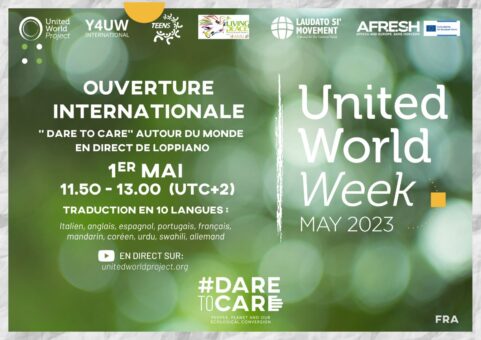 On 1st May at 12.00, a major show, entitled “Common Ground, me, you and us”, broadcast live from the Auditorium of Loppiano (Italy), will officially inaugurate the 28th United World Week. The challenge? To rediscover the value of care, of taking care of oneself and of others, of the relationships that connect us and of our relationship with Mother Earth. The programme will include the testimonies of young change makers from various countries of the world, who are engaged in networking, often bravely going against the current in their taking care of people and the environment, for the common good of their peoples. Like Mimmy from Burundi who, as part of the fight against plastic pollution, has been elected “zero plastic” ambassador, because, with her association, she transforms plastic into ecological tiles and plants trees in the Rusizi National Park. Or Ivan, who in Damaguete (Philippines), with his community, takes care of his people through their commitment to the marine environment and planting mangroves, because he says: “Since we are one of the poorest countries in Asia, fishing is a means of livelihood for many. Our people need the sea to survive, for everyday life.” The live stream will be available at www.unitedworldproject.org.
On 1st May at 12.00, a major show, entitled “Common Ground, me, you and us”, broadcast live from the Auditorium of Loppiano (Italy), will officially inaugurate the 28th United World Week. The challenge? To rediscover the value of care, of taking care of oneself and of others, of the relationships that connect us and of our relationship with Mother Earth. The programme will include the testimonies of young change makers from various countries of the world, who are engaged in networking, often bravely going against the current in their taking care of people and the environment, for the common good of their peoples. Like Mimmy from Burundi who, as part of the fight against plastic pollution, has been elected “zero plastic” ambassador, because, with her association, she transforms plastic into ecological tiles and plants trees in the Rusizi National Park. Or Ivan, who in Damaguete (Philippines), with his community, takes care of his people through their commitment to the marine environment and planting mangroves, because he says: “Since we are one of the poorest countries in Asia, fishing is a means of livelihood for many. Our people need the sea to survive, for everyday life.” The live stream will be available at www.unitedworldproject.org. 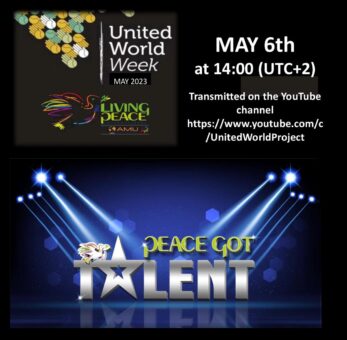 On Saturday 6th May, it will be the turn of “Peace Got Talent”, an artistic event promoted by the “Living Peace International” network that, taking its cue from the well-known television format, gives space to talented young people who are committed to promoting peace through music, song and dance. Each act in the competition is an expression of informal projects of peace education. The participating schools and groups include some from Ukraine, Syria, Russia, Myanmar and Congo: Countries affected by war and armed conflicts, which are eager to contribute their songs and their voices of hope. The show will be broadcast on www.unitedworldproject.org.
On Saturday 6th May, it will be the turn of “Peace Got Talent”, an artistic event promoted by the “Living Peace International” network that, taking its cue from the well-known television format, gives space to talented young people who are committed to promoting peace through music, song and dance. Each act in the competition is an expression of informal projects of peace education. The participating schools and groups include some from Ukraine, Syria, Russia, Myanmar and Congo: Countries affected by war and armed conflicts, which are eager to contribute their songs and their voices of hope. The show will be broadcast on www.unitedworldproject.org.  On Sunday, 7th May, over 200,000 teenagers, young adults and families in many countries and hundreds of cities will participate in “Run4Unity,” a global relay race that links nations, cultures and religions to build peace and plant trees. Supported and promoted by the Laudato Sì Action Platform of the Vatican’s Dicastery for the Promoting Integral Human Development, Run4Unity 2023 is led by the young people of the Focolare Movement. Participants of all ages will look after their health through physical exercise and will take care of the Earth by converting the kilometres completed or minutes of exercise to trees to be planted around the world (https://www.teens4unity.org/run4unity). Run4Unity will start from the Fiji Islands, which is in the first time zone to begin a new day and is an ecologically symbolic country because it is already strongly affected by climate change. From there, over the next 24 hours, young people will pass the virtual “baton” from one time zone to another through a series of video calls, concluding with communities in California. Participants will run, jog, walk or participate in local sporting events, some of which will be held in places symbolic for peace, for example at the borders between countries or communities in conflict or in ecologically significant places, to give a witness of unity and peace. Participants will include some of the 1,000 Laudato Sì schools around the world which are engaged in ecological education through the Laudato Sì Action Platform, as well as groups and schools that are part of the Living Peace International Project. Information about all the local events for United World Week 2023 can be found at: https://www.unitedworldproject.org/uww2023/.
On Sunday, 7th May, over 200,000 teenagers, young adults and families in many countries and hundreds of cities will participate in “Run4Unity,” a global relay race that links nations, cultures and religions to build peace and plant trees. Supported and promoted by the Laudato Sì Action Platform of the Vatican’s Dicastery for the Promoting Integral Human Development, Run4Unity 2023 is led by the young people of the Focolare Movement. Participants of all ages will look after their health through physical exercise and will take care of the Earth by converting the kilometres completed or minutes of exercise to trees to be planted around the world (https://www.teens4unity.org/run4unity). Run4Unity will start from the Fiji Islands, which is in the first time zone to begin a new day and is an ecologically symbolic country because it is already strongly affected by climate change. From there, over the next 24 hours, young people will pass the virtual “baton” from one time zone to another through a series of video calls, concluding with communities in California. Participants will run, jog, walk or participate in local sporting events, some of which will be held in places symbolic for peace, for example at the borders between countries or communities in conflict or in ecologically significant places, to give a witness of unity and peace. Participants will include some of the 1,000 Laudato Sì schools around the world which are engaged in ecological education through the Laudato Sì Action Platform, as well as groups and schools that are part of the Living Peace International Project. Information about all the local events for United World Week 2023 can be found at: https://www.unitedworldproject.org/uww2023/.
Tamara Pastorelli (Photo: Pixabay)
Apr 28, 2023 | Non categorizzato
This is true friendship: a profound bond where not only our own destiny is at stake, but the destiny of the other as well, their own story. Friendship is a free good, a lost good – an authentic relationship where each person, supporting the other, continually finds themselves in the end. The friend in difficulty I was driving to work when I spotted a former university colleague on the road. I gave him a lift, and on the way he told me about his problems. Because of Covid, he had lost his job as a waiter. And the accommodation where he lived was without hot water and electricity because he had not paid his bills. I spontaneously invited him to take a shower at my place and wash his clothes whenever he needed to. He gladly accepted. One day he came as usual. He was not well, but he did not have the courage to tell me. After two days, I learned I had Covid. When this friend found out, he realised that he was the one who had infected me, so he didn’t feel like coming back to wash at my place. However, I reassured him that I had nothing against him, and we started seeing each other again. If I found the strength to go out to meet this brother of mine, it was because as a Christian I feel called to stop and see the needs and wants of my neighbour, to help him and love him as Jesus tells us in the Gospel. Steve, Burundi A marriage in crisis From Brazil, the home of her ‘great love’, Brigitte had written to me that her husband, who had become an alcoholic, had abandoned her and their three children. With my husband’s consent, I decided to visit her. Although the trip was a heavy expense for our finances, the desire to be close to this long-time friend prevailed. I found Brigitte devastated, disappointed, disoriented. She wondered why her fate left her far from her homeland and relatives, alone, a failure in every sense. We talked about the possibility of a return to France. But she did not see the total estrangement from their father as positive for the children. I could understand her. While I was there, I contacted the publishing house where I work, which had some French translation work for her. But the real gift for Brigitte, and for me, was remembering our younger years. Thinking back to our questions about faith and the desire to build a more human world, she seemed to reanimate that dream. At last, she herself had found the most concrete way to commit herself to others, a way towards rebuilding. I left refreshed. J.P., France
Edited by Maria Grazia Berretta.
From “Il Vangelo del Giorno”, Città Nuova, year IX, n.1, March–April 2023.
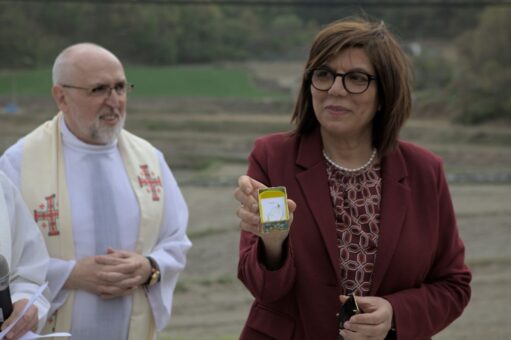
Apr 27, 2023 | Focolari nel Mondo, Non categorizzato
Margaret Karram and Jesús Morán, President and Co-President of the Focolare Movement, have just concluded the Korean step of their first official trip to Asia and Oceania. This will be followed by visits to Japan, the Fiji Islands, Australia and Indonesia, until 25 May. Here is a brief update on what happened in Korea.
“Teach us, Lord, to journey together, looking in the same direction, united by the same goal, in search of the same values towards the One who loves us and awaits us, who is the foundation of every new friendship’.
On 22nd April, this prayer was said at the start of the meeting of 160 focolarini and focolarine from East Asia (with several linked online). It expresses very well the meaning of Margaret Karram and Jesús Morán’s first official trip to Asia and Oceania. The first stop has been Korea, then they will visit Japan, the Fiji Islands, Australia and finally Indonesia. They are being accompanied by Rita Moussallem and Antonio Salimbeni, councillors of the zone and co-responsible for the interreligious dialogue of the Focolare Movement The Movement has been present In East Asia since the end of the 1960s (the zone includes Korea, Japan, and the Chinese-speaking area). In Korea, Father Francesco Shim brought the spirituality of unity in 1967 and in Hong Kong the first focolare was opened in 1970. There are about 10,000 members and adherents of the Movement living the spirituality of unity in this part of Asia.
Margaret Karram: Starting again from dialogue
“Why did you choose Asia for your first trip?”, the reporter of the ‘Catholic Chinmoon’, Korea’s leading Catholic weekly asked Margaret. “I am here to listen, to learn, but above all to love the ‘continent of hope’,” she replied. The spiritual wealth of these peoples will be a gift for all. I feel it is very important to revive the path of dialogue in the Movement; it is the most important instrument for building peace, which is the good that the world needs most today’.
Korea: between contradictions and hope for peace
The capital city, Seoul, has almost 10 million inhabitants and showcases a nation that has been running at speed for 50 years and has become one of the most advanced and technological states in the world. ‘Speed, efficiency and competitiveness are the hallmarks of modern Korean society,’ explains Matthew Choi, a Korean journalist and focolarino, ‘both economically and culturally, but this brings many contradictions with it. ‘There is a great emphasis on achievement here,’ adds Kil Jeong Woo, delegate of the Politics for Unity Movement in Korea, ‘with a highly competitive academic system and a strong work ethic. We have problems of social inequality, and efforts are underway to address this through social and political reforms, but progress is slow.”
The Korean Church, a bridge in a divided society
The Archbishop of Seoul, Archbishop Peter Chung Soon-taek, highlighted among the social challenges intergenerational conflicts and an ageing population. He explained that ‘In the Church, there is the danger of closing ourselves off in our communities. Instead, we need to open up and this is the contribution that the Focolare can bring”. Margaret Karram and Jesús Morán then met Bishop Thaddeo Cho, Archbishop of Daegu, Bishop Augustino Kim, Bishop of Daejeon and Bishop Simon Kim, Bishop of Cheng-ju. In the context of strong polarisation between progressives and conservatives, the Church is seeking to be a bridge and act as an antidote to the secularisation that is affecting young people in particular.
Dialogues and inundations: the journey has begun.
The Focolare Movement in Korea is making its contribution to ecumenical and interreligious dialogue, and also in various cultural spheres. One example was the event on 14 April in Seoul, entitled: “Dialogue is becoming the culture of the human family”. Representatives from various Christian churches, various religions, and representatives from the social fields took part, animated by a constructive spirit of cooperation for social reconciliation and peace. In her talk Margaret said: “It is very important that everyone can generate environments that open the way to the ‘dialogue of life,’ by putting into practice the teachings of their own religious faith”. Jesús Morán encouraged them to continue on this common path: “It does not matter how big or small the things you do are. The important thing is that they bring the seeds of something new. The testimonies you have presented show this clearly”. Sa Young-in, Director of the UN Office for Won Buddhism, said that as a young girl she dreamed of a “religious village” where believers of various religions could share love, grace, and mercy. “What I imagined,” she said, “I feel I can see fulfilled here today”.
Gen 2: “Courage and go ahead!”
On 15 April 80 Gen gathered at the Mariapolis Centre: 70 from Korea, 9 from Hong Kong and others were linked up from Japan and Chinese-speaking areas. They brought Margaret Karram and Jesús Morán the fruit of the work done in four workshops on how to incarnate the spirituality of unity in everyday life; relationships within and outside the Movement; the difficulties they face in finding their human and spiritual identity and their dreams for the Movement. Margaret said to them: “Our identity is one. We are not Gen first, and then become something else when, for example, we go to university. The gift of the spirituality that we have received makes us free people; it gives us the courage and strength to proclaim what we are and what we believe in, and I would also like to say to you what the Pope said to me when I was elected president: ‘courage and forward'”. One of the Gen said: ‘After Chiara’s departure,’, ‘there were moments when I felt nostalgia and darkness. Today, Margaret and Jesús’ closeness to us, their trust and listening have encouraged me a lot. They make me realise once again that Chiara’s legacy is a gift from God suitable for every age’.
The little town – armony
armony
On 16 April, Margaret Karram and Jesús Morán went to the land that the Movement had received as a gift, about 70 kilometres south of Seoul, to fulfil a dream Chiara spoke of during her visit to Korea in 1982: the birth of a little town of formation and witness to Gospel life and the spirituality of unity for this part of Asia. In the presence of about 200 people – Focolare members, benefactors and friends who contributed in various ways – the land was blessed, and a medal of Mary was buried there as a seal. “Let us entrust this Work to her,” Margaret concluded, “and ask her to help us adhere to God’s plans that maybe we do not yet know, but He is greater than us and if we give Him our willingness and generosity, He will be able to work.”
Visiting Sungsimdang
It all started in 1956, with two sacks of flour used to make steamed bread to sell in front of Daejeon Station. Today, Sungsimdang has become the city’s most famous restaurant business and, with its 848 employees, has been living the spirit of the Economy of Communion (EoC) to the full since 1999. Margaret and Jesús visited it and had a joyful meeting with Fedes Im and his wife Amata Kim who are the owners and are Volunteers of the Movement. ‘I didn’t study administration or management,’ says Fedes, ‘but I followed Chiara. “Seek to do good before all people,” is the motto she gave to the business that serves 10,000 customers a day and has always lived sharing, bringing bread daily to more than 80 social assistance centres. But what is striking is the atmosphere and relationships in the workplace: “For us,” says their daughter Sole, who is head of the catering department, “all people have the same value: men and women, rich and poor, managers and employees, suppliers and customers. We try to put the person at the centre of all our decisions’. Jesús emphasised the importance of the business’s impact in the local area, an important part of companies operating in the EoC style, and Margaret compared their testimony to that of a little town of the Movement about which one can say, “come and see”. “And that,” she said, “is the greatest medicine the world is waiting for.”
Listening, knowing, sharing
Margaret Karram and Jesús Morán’ days in Korea were intense and varied, but there was also time for a tourist visit to the ancient site of Bulguksa, to learn about the roots of the national Buddhist culture. Located in beautiful parkland, with its thousand-year-old temples, they spent a truly regenerating day! There have also been many meetings with members of the Movement in this vast zone, such as the joyful afternoon with the focolarini and with some members of the Chinese-speaking area. The time with the 80 priests, and men and women religious was a ‘cenacle’ experience, with testimonies of faithfulness and authentic gospel life, in a profound conversation with Margaret and Jesús. Then, on 23 April, it was the turn of the long-awaited meeting with all the members of the Movement; 1,200 were present, with about 200 connected online from various countries. It was an amazing celebration, bringing together peoples and cultures that we would hardly ever see dancing and singing on the same stage, and rejoicing in each other’s beauty and richness. Perhaps that is why some called the event ‘a miracle’ and the seed of a society renewed by unity. 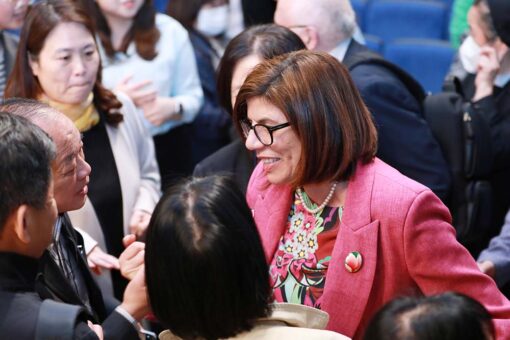 In the dialogue, Margaret Karram and Jesús Morán answered questions on a variety of topics, together with the councillors Rita Moussallem and Antonio Salimbeni. These included the ‘design’ of the Asian continent, the relevance today of dialogue between religions. To the question on how to have a deeper relationship with Jesus in the Eucharist, Jesús explained that it is not a matter of ‘feeling’ the relationship with Him, but of living it, because the Eucharist nourishes our whole person and makes us live as a body, in love for others”. Speaking of the decline in vocations in the Movement, Margaret said that for young people, personal relationships and the authentic witness of adults are important. “If our life is fruit of union with God and is coherent with the Gospel, they will be attracted, because they take inspiration from those who ‘dare’ to live for God and so they will understand where He is calling them”. To the last question on how our relationships must be in order to be able to dialogue with everyone, Margaret Karram answered with her own experience: “This year we have deepened our prayer life and our love for God, a ‘vertical’ love we might say, like those pine trees whose branches go upwards. The other day, while I was outside for a walk, I saw a tree that I liked very much: its branches were open, extending outwards; they intertwined with other trees. This is how our relationships should be: our arms should always be open, reaching out to others; we should have our hearts wide open to the joys, sorrows, and lives of all the people who pass us by.” It is ‘the hour of Asia’, Chiara Lubich wrote in 1986, during her first trip to these countries; today those words are manifesting all their relevance and prophetic value.
In the dialogue, Margaret Karram and Jesús Morán answered questions on a variety of topics, together with the councillors Rita Moussallem and Antonio Salimbeni. These included the ‘design’ of the Asian continent, the relevance today of dialogue between religions. To the question on how to have a deeper relationship with Jesus in the Eucharist, Jesús explained that it is not a matter of ‘feeling’ the relationship with Him, but of living it, because the Eucharist nourishes our whole person and makes us live as a body, in love for others”. Speaking of the decline in vocations in the Movement, Margaret said that for young people, personal relationships and the authentic witness of adults are important. “If our life is fruit of union with God and is coherent with the Gospel, they will be attracted, because they take inspiration from those who ‘dare’ to live for God and so they will understand where He is calling them”. To the last question on how our relationships must be in order to be able to dialogue with everyone, Margaret Karram answered with her own experience: “This year we have deepened our prayer life and our love for God, a ‘vertical’ love we might say, like those pine trees whose branches go upwards. The other day, while I was outside for a walk, I saw a tree that I liked very much: its branches were open, extending outwards; they intertwined with other trees. This is how our relationships should be: our arms should always be open, reaching out to others; we should have our hearts wide open to the joys, sorrows, and lives of all the people who pass us by.” It is ‘the hour of Asia’, Chiara Lubich wrote in 1986, during her first trip to these countries; today those words are manifesting all their relevance and prophetic value.
Stefania Tanesini
Apr 20, 2023 | Non categorizzato
Jean Paul is a young man from Burundi who, in 2015, at a time of frequent internal conflict in the country, was ambushed and suffered life-threatening injuries. His experience tells of pain transformed by faith, and by loving support from many people around the world. His story became a firm foundation on which to bear witness to God’s love. https://www.youtube.com/watch?v=gXLnHUqw5eA&list=PL9YsVtizqrYt2S6qrtBBS1Xu_B3p-juwd Copyright 2023 © CSC Audiovisivi

 “From the moment I heard that I had been elected to participate, I felt a great joy but also the responsibility to be a true channel through which the Holy Spirit can pass.” This is what Mercedes Isola, a volunteer of the Focolare Movement, said. She was elected by the Bishops in the region of La Plata, Argentina, to be a lay participant in the Continental Assembly for the Synod of the Southern Cone that took place in Brasilia, Brazil, at the headquarters of the CNBB (National Conference of Bishops of Brazil). Mercedes continues, “There was very deep sharing among us and we rediscovered our baptismal dignity that makes us all sisters and brothers, people of God, co-responsible in mission, regardless of vocation. The ‘discernment communities’, made up of people from different experiences and vocations, were a confirmation of this reality: the Holy Spirit is at work in everyone, without distinction.”
“From the moment I heard that I had been elected to participate, I felt a great joy but also the responsibility to be a true channel through which the Holy Spirit can pass.” This is what Mercedes Isola, a volunteer of the Focolare Movement, said. She was elected by the Bishops in the region of La Plata, Argentina, to be a lay participant in the Continental Assembly for the Synod of the Southern Cone that took place in Brasilia, Brazil, at the headquarters of the CNBB (National Conference of Bishops of Brazil). Mercedes continues, “There was very deep sharing among us and we rediscovered our baptismal dignity that makes us all sisters and brothers, people of God, co-responsible in mission, regardless of vocation. The ‘discernment communities’, made up of people from different experiences and vocations, were a confirmation of this reality: the Holy Spirit is at work in everyone, without distinction.”  The meeting was attended by more than 200 people. It began with a procession of images of the Virgin Mary, patroness of each country, to whom the work of this Assembly was entrusted. Brazilians, Chileans, Uruguayans, Argentinians and Paraguayans were brought together. It was apparent that amid the diversity of each people, the individual in dialogue with others becomes a builder of true synodality. “Being open to a Church with greater lay participation, a Church that is inclusive, transparent, and consistent in following Jesus and is concrete in its service and mission,” are just some of the points that were addressed and deepened during the Assembly. Eliane de Carli, a married focolarina from Brazil, tells us. “This experience based upon a practice known as ‘spiritual conversion’, ensured there was very deep communion in the working groups. In addition, the richness of this internationality allowed us to get to know the challenges of the Church in each country, some of them very similar.”
The meeting was attended by more than 200 people. It began with a procession of images of the Virgin Mary, patroness of each country, to whom the work of this Assembly was entrusted. Brazilians, Chileans, Uruguayans, Argentinians and Paraguayans were brought together. It was apparent that amid the diversity of each people, the individual in dialogue with others becomes a builder of true synodality. “Being open to a Church with greater lay participation, a Church that is inclusive, transparent, and consistent in following Jesus and is concrete in its service and mission,” are just some of the points that were addressed and deepened during the Assembly. Eliane de Carli, a married focolarina from Brazil, tells us. “This experience based upon a practice known as ‘spiritual conversion’, ensured there was very deep communion in the working groups. In addition, the richness of this internationality allowed us to get to know the challenges of the Church in each country, some of them very similar.”  A week of intense work turned into a life experience. This can be seen in what Marise Braga, a Brazilian focolarina, said: “The day began with a short prayer led by each country in turn. The group drafted a final document on the basis of the questionnaires collected in the various countries during the local phase. They answered three questions, highlighting the lights and positive elements that emerged from those reports, highlighting the shadows, tensions and challenges of certain issues in each country, and finally, recognising the priorities to be addressed in the Synod.” The role of women in the Church was one of the recurring themes during this Continental Assembly in the Southern Cone. This is an issue that is gaining importance and, along with engagement with young people, needs to be addressed. “Before the concluding Mass of this synodal phase, the young people asked to speak,” said Mercedes Isola. “It was very powerful to hear from them why their friends are no longer in the Church. The young people themselves asked for greater openness, a Church that allows all God’s people to be protagonists, with open doors as Pope Francis says.”
A week of intense work turned into a life experience. This can be seen in what Marise Braga, a Brazilian focolarina, said: “The day began with a short prayer led by each country in turn. The group drafted a final document on the basis of the questionnaires collected in the various countries during the local phase. They answered three questions, highlighting the lights and positive elements that emerged from those reports, highlighting the shadows, tensions and challenges of certain issues in each country, and finally, recognising the priorities to be addressed in the Synod.” The role of women in the Church was one of the recurring themes during this Continental Assembly in the Southern Cone. This is an issue that is gaining importance and, along with engagement with young people, needs to be addressed. “Before the concluding Mass of this synodal phase, the young people asked to speak,” said Mercedes Isola. “It was very powerful to hear from them why their friends are no longer in the Church. The young people themselves asked for greater openness, a Church that allows all God’s people to be protagonists, with open doors as Pope Francis says.” Father Pedro Brassesco, Assistant Secretary of CELAM (Latin American and Caribbean Episcopal Council) said that these needs unite all the continents and will push us to “learn a new way of being Church.” “The Church has called us together and is listening to us,” Marise concluded, ‘not only the Bishops, but all the people of God. We often need to invert the pyramid to know what is at the bottom, but patience is needed to see the fruits of this work. Perhaps our children, grandchildren and great-grandchildren will enjoy it. We are now planting a seed, but we must have hope. It is a first step, towards a Church that is closer to us all.”
Father Pedro Brassesco, Assistant Secretary of CELAM (Latin American and Caribbean Episcopal Council) said that these needs unite all the continents and will push us to “learn a new way of being Church.” “The Church has called us together and is listening to us,” Marise concluded, ‘not only the Bishops, but all the people of God. We often need to invert the pyramid to know what is at the bottom, but patience is needed to see the fruits of this work. Perhaps our children, grandchildren and great-grandchildren will enjoy it. We are now planting a seed, but we must have hope. It is a first step, towards a Church that is closer to us all.” 

 The doors to the “Land of the Rising Sun” were opened to them by the Archbishop of Tokyo, Archbishop Tarcisius Isao Kikuchi. He described the local Catholic Church as “small and silent”. There are 536,000 Christians who form 0.4% out of a population of 130 million where Buddhism and Shintoism are the majority religions. It is difficult to know which is the main one, since many Japanese follow both, and so there is a tendency to bring together different aspects of various religions. He explained that the current lifestyle is leading to a disintegration of the family, and this causes people to feel lonely and cut off. “There is a need to recreate community,” he said, “and the Focolare can help the Church do this. I encourage you to make your spirituality known to the bishops first (there are sixteen in Japan), so that through them it reaches the communities’.
The doors to the “Land of the Rising Sun” were opened to them by the Archbishop of Tokyo, Archbishop Tarcisius Isao Kikuchi. He described the local Catholic Church as “small and silent”. There are 536,000 Christians who form 0.4% out of a population of 130 million where Buddhism and Shintoism are the majority religions. It is difficult to know which is the main one, since many Japanese follow both, and so there is a tendency to bring together different aspects of various religions. He explained that the current lifestyle is leading to a disintegration of the family, and this causes people to feel lonely and cut off. “There is a need to recreate community,” he said, “and the Focolare can help the Church do this. I encourage you to make your spirituality known to the bishops first (there are sixteen in Japan), so that through them it reaches the communities’.  The conversation continued during the visit to Archbishop Leo Boccardi, Apostolic Nuncio in Tokyo. Christians are only 2% of the population of Asia. So, what is their role? The Nuncio too encouraged the Focolare to spread the charism of fraternity. “In Japan there is order and respect among people,” he explained, “but there is also a lot of indifference. The pandemic has left an open wound: we must rebuild relationships”. “I have seen a church being born,”
The conversation continued during the visit to Archbishop Leo Boccardi, Apostolic Nuncio in Tokyo. Christians are only 2% of the population of Asia. So, what is their role? The Nuncio too encouraged the Focolare to spread the charism of fraternity. “In Japan there is order and respect among people,” he explained, “but there is also a lot of indifference. The pandemic has left an open wound: we must rebuild relationships”. “I have seen a church being born,”  The Japanese are guided by the ‘feeling of the heart’ that knows how to grasp what is essential from concrete facts. And it is significant that the first meeting President and Co-President of the Focolare had was with the young people of the Movement, the Gen. They shared with one another in a harmonious atmosphere of simplicity and family. There was the same depth of relationship and sharing in their meetings with the focolarini and volunteers. Jesuits and Focolare together, a sign of hope for the world On 29 April, the Catholic university in Tokyo, Sophia University, hosted the eagerly awaited symposium “Can we be a sign of hope for the world?”, to which Margaret Karram and Jesús Morán were invited as speakers. The seminar offered an exceptional opportunity for dialogue between two charisms: the ‘historical’ one of St Ignatius, which brought Christianity to Japan in the 16th century, and the charism of Chiara Lubich. The focus was on the subjects of dialogue and unity in a social and religious context which is thirsting for spirituality. The other speakers were Fathers Renzo De Luca, the Jesuit provincial in Japan, Augustine Sali and Juan Haidar, lecturers at the university. The potential of this synergy emerged clearly from the talks. Margaret Karram began by saying that hope is what humanity needs most and it can be found if we engage in dialogue, even with those who are very different from us, without ever wearying. And she concluded: ‘The small and large efforts towards dialogue that each one of us can make, in building heartfelt and warm relationships, are the solid foundation on which to build a more fraternal world’. Fr De Luca explained how dialogue has been part of the DNA of Japanese Christians since the beginning. “During the persecutions, they did not reciprocate the violence they received with more violence, which is why the Popes have presented them to the world as a model”. Fr Sali reflected on the challenges of the Japanese Church in the face of secularisation, a church which must find new pathways for dialogue to offer Christian spirituality to people everywhere. In his talk, Jesús Morán explained that the Synodal path, that the Catholic Church is taking, can be an answer, but only if it is animated by communion-fellowship. “Communion and synodality naturally lead to a new encouragement to dialogue, which is increasingly necessary given the growing polarisation of societies at all levels”. Fr Haidar returned to the theme of hope and assured all present that “We have no reason to lose hope, because good is stronger than evil and God is always on the side of those who do good”. One of the symposium participants defined this shared reflection by Jesuits and the Focolare, as a “chemical reaction” that can produce new life. “I realised that dialogue requires courage, perseverance and patience; above all, I have to start doing it myself”.
The Japanese are guided by the ‘feeling of the heart’ that knows how to grasp what is essential from concrete facts. And it is significant that the first meeting President and Co-President of the Focolare had was with the young people of the Movement, the Gen. They shared with one another in a harmonious atmosphere of simplicity and family. There was the same depth of relationship and sharing in their meetings with the focolarini and volunteers. Jesuits and Focolare together, a sign of hope for the world On 29 April, the Catholic university in Tokyo, Sophia University, hosted the eagerly awaited symposium “Can we be a sign of hope for the world?”, to which Margaret Karram and Jesús Morán were invited as speakers. The seminar offered an exceptional opportunity for dialogue between two charisms: the ‘historical’ one of St Ignatius, which brought Christianity to Japan in the 16th century, and the charism of Chiara Lubich. The focus was on the subjects of dialogue and unity in a social and religious context which is thirsting for spirituality. The other speakers were Fathers Renzo De Luca, the Jesuit provincial in Japan, Augustine Sali and Juan Haidar, lecturers at the university. The potential of this synergy emerged clearly from the talks. Margaret Karram began by saying that hope is what humanity needs most and it can be found if we engage in dialogue, even with those who are very different from us, without ever wearying. And she concluded: ‘The small and large efforts towards dialogue that each one of us can make, in building heartfelt and warm relationships, are the solid foundation on which to build a more fraternal world’. Fr De Luca explained how dialogue has been part of the DNA of Japanese Christians since the beginning. “During the persecutions, they did not reciprocate the violence they received with more violence, which is why the Popes have presented them to the world as a model”. Fr Sali reflected on the challenges of the Japanese Church in the face of secularisation, a church which must find new pathways for dialogue to offer Christian spirituality to people everywhere. In his talk, Jesús Morán explained that the Synodal path, that the Catholic Church is taking, can be an answer, but only if it is animated by communion-fellowship. “Communion and synodality naturally lead to a new encouragement to dialogue, which is increasingly necessary given the growing polarisation of societies at all levels”. Fr Haidar returned to the theme of hope and assured all present that “We have no reason to lose hope, because good is stronger than evil and God is always on the side of those who do good”. One of the symposium participants defined this shared reflection by Jesuits and the Focolare, as a “chemical reaction” that can produce new life. “I realised that dialogue requires courage, perseverance and patience; above all, I have to start doing it myself”.  “Open your hearts to everyone”, Margaret Karram’s message for the Focolare community “We are here because we want to share what we have received as a gift from God,” said Natzumi and Masaki at the start of the meeting with the Focolare community in Japan that same afternoon. There was joy and emotion in being together in person for the first time in almost three and a half years, after the pandemic. The experiences shared spoke of great faithfulness in living the Gospel in daily life in a social context that is often hostile, due to indifference or social distance. One volunteer touched on a challenging issue for all Christians in Japan: the difficulty in handing on the faith, especially to the younger generations. “If you live the Word,” Jesús Morán replied, “you can be sure that you are giving Jesus. Usually we want to see results, but Jesus is not interested in this because He wants to touch people with His life. Let us give Him everything, then He will reap what He wants and how He wants”. “Do you have a message for the Focolare community in Japan?” This was the last question that came as a surprise for President and Co-President: “The message is dialogue,” Margaret Karram replied. “I encourage you to have a new openness of heart towards everyone. It is true that Christians are a minority here, but our vocation, as members of Focolare, is to go out to others, courageously, and to open up new paths that can help build fraternity and a peaceful world’. Jesús went on: “Our specific lifestyle is to live unity and so each one of us is fully in our vocation. We are a ‘sacrament of God’s love’ for others, as Chiara Lubich says. May no one feel alone, but go forward together, because faith is lived together’. Visiting the Rissho Kosei-kai: we are one family On 1 May, 42 years after Chiara Lubich’s visit, Margaret Karram and the Focolare delegation accompanying her, entered the large sacred hall of the Rissho Kosei-kai (RKK) Centre. It is difficult to describe the joy and emotion, visible on everyone’s faces: it was like an embrace between brothers and sisters who have been journeying together for many years. This warmth was expressed by President Nichiko Niwano and his daughter Kosho.
“Open your hearts to everyone”, Margaret Karram’s message for the Focolare community “We are here because we want to share what we have received as a gift from God,” said Natzumi and Masaki at the start of the meeting with the Focolare community in Japan that same afternoon. There was joy and emotion in being together in person for the first time in almost three and a half years, after the pandemic. The experiences shared spoke of great faithfulness in living the Gospel in daily life in a social context that is often hostile, due to indifference or social distance. One volunteer touched on a challenging issue for all Christians in Japan: the difficulty in handing on the faith, especially to the younger generations. “If you live the Word,” Jesús Morán replied, “you can be sure that you are giving Jesus. Usually we want to see results, but Jesus is not interested in this because He wants to touch people with His life. Let us give Him everything, then He will reap what He wants and how He wants”. “Do you have a message for the Focolare community in Japan?” This was the last question that came as a surprise for President and Co-President: “The message is dialogue,” Margaret Karram replied. “I encourage you to have a new openness of heart towards everyone. It is true that Christians are a minority here, but our vocation, as members of Focolare, is to go out to others, courageously, and to open up new paths that can help build fraternity and a peaceful world’. Jesús went on: “Our specific lifestyle is to live unity and so each one of us is fully in our vocation. We are a ‘sacrament of God’s love’ for others, as Chiara Lubich says. May no one feel alone, but go forward together, because faith is lived together’. Visiting the Rissho Kosei-kai: we are one family On 1 May, 42 years after Chiara Lubich’s visit, Margaret Karram and the Focolare delegation accompanying her, entered the large sacred hall of the Rissho Kosei-kai (RKK) Centre. It is difficult to describe the joy and emotion, visible on everyone’s faces: it was like an embrace between brothers and sisters who have been journeying together for many years. This warmth was expressed by President Nichiko Niwano and his daughter Kosho.  The Rissho Kosei-kai is a lay Buddhist movement founded in 1938 by the Reverend Nikkyo Niwano. It has about one million followers in Japan, and centres in several countries. It is very active in promoting peace and well-being through humanitarian and cooperative action. In 1979 Nikkyo Niwano met Chiara for the first time. Speaking of her he said, “I have met an extraordinary person with whom I can live in fellowship.” Since then, the relationship between the two movements has never been interrupted. ‘Today we are here as one big family,’ Margaret Karram said in her greeting to the many people present and those following the ceremony online, ‘What all humanity holds most dear is the supreme value of peace. (…). Together we can be a sign of hope in the world; together, as one family, our two Movements can be like small lights shining in society, living compassion and love, which are our most powerful weapons”. Nichiko Niwano responded saying, “Today is a day we will not forget; it is a day to be grateful for because our movements are meeting together. We are like members of one family, and we have so much in common. “It is the dialogue between us that makes this happen,” continued his daughter Kosho, who in the future will succeed to the RKK presidency, “I thank my grandfather Nikkyo Niwano who made dialogue and meeting others the foundation of my life. “We experienced a morning of recollection and sacredness,” Margaret Karram concluded, “and I am bringing with me what I have learnt thanks to you: to always be grateful for what I receive as a gift. I renew the Focolare’s commitment to go forward together to fulfil the dream of a better world”.
The Rissho Kosei-kai is a lay Buddhist movement founded in 1938 by the Reverend Nikkyo Niwano. It has about one million followers in Japan, and centres in several countries. It is very active in promoting peace and well-being through humanitarian and cooperative action. In 1979 Nikkyo Niwano met Chiara for the first time. Speaking of her he said, “I have met an extraordinary person with whom I can live in fellowship.” Since then, the relationship between the two movements has never been interrupted. ‘Today we are here as one big family,’ Margaret Karram said in her greeting to the many people present and those following the ceremony online, ‘What all humanity holds most dear is the supreme value of peace. (…). Together we can be a sign of hope in the world; together, as one family, our two Movements can be like small lights shining in society, living compassion and love, which are our most powerful weapons”. Nichiko Niwano responded saying, “Today is a day we will not forget; it is a day to be grateful for because our movements are meeting together. We are like members of one family, and we have so much in common. “It is the dialogue between us that makes this happen,” continued his daughter Kosho, who in the future will succeed to the RKK presidency, “I thank my grandfather Nikkyo Niwano who made dialogue and meeting others the foundation of my life. “We experienced a morning of recollection and sacredness,” Margaret Karram concluded, “and I am bringing with me what I have learnt thanks to you: to always be grateful for what I receive as a gift. I renew the Focolare’s commitment to go forward together to fulfil the dream of a better world”. 
 On 1st May at 12.00, a major show, entitled “Common Ground, me, you and us”, broadcast live from the Auditorium of Loppiano (Italy), will officially inaugurate the 28th United World Week. The challenge? To rediscover the value of care, of taking care of oneself and of others, of the relationships that connect us and of our relationship with Mother Earth. The programme will include the testimonies of young change makers from various countries of the world, who are engaged in networking, often bravely going against the current in their taking care of people and the environment, for the common good of their peoples. Like Mimmy from Burundi who, as part of the fight against plastic pollution, has been elected “zero plastic” ambassador, because, with her association, she transforms plastic into ecological tiles and plants trees in the Rusizi National Park. Or Ivan, who in Damaguete (Philippines), with his community, takes care of his people through their commitment to the marine environment and planting mangroves, because he says: “Since we are one of the poorest countries in Asia, fishing is a means of livelihood for many. Our people need the sea to survive, for everyday life.” The live stream will be available at
On 1st May at 12.00, a major show, entitled “Common Ground, me, you and us”, broadcast live from the Auditorium of Loppiano (Italy), will officially inaugurate the 28th United World Week. The challenge? To rediscover the value of care, of taking care of oneself and of others, of the relationships that connect us and of our relationship with Mother Earth. The programme will include the testimonies of young change makers from various countries of the world, who are engaged in networking, often bravely going against the current in their taking care of people and the environment, for the common good of their peoples. Like Mimmy from Burundi who, as part of the fight against plastic pollution, has been elected “zero plastic” ambassador, because, with her association, she transforms plastic into ecological tiles and plants trees in the Rusizi National Park. Or Ivan, who in Damaguete (Philippines), with his community, takes care of his people through their commitment to the marine environment and planting mangroves, because he says: “Since we are one of the poorest countries in Asia, fishing is a means of livelihood for many. Our people need the sea to survive, for everyday life.” The live stream will be available at  On Saturday 6th May, it will be the turn of “Peace Got Talent”, an artistic event promoted by the “
On Saturday 6th May, it will be the turn of “Peace Got Talent”, an artistic event promoted by the “
 In the dialogue, Margaret Karram and Jesús Morán answered questions on a variety of topics, together with the councillors Rita Moussallem and Antonio Salimbeni. These included the ‘design’ of the Asian continent, the relevance today of dialogue between religions. To the question on how to have a deeper relationship with Jesus in the Eucharist, Jesús explained that it is not a matter of ‘feeling’ the relationship with Him, but of living it, because the Eucharist nourishes our whole person and makes us live as a body, in love for others”. Speaking of the decline in vocations in the Movement, Margaret said that for young people, personal relationships and the authentic witness of adults are important. “If our life is fruit of union with God and is coherent with the Gospel, they will be attracted, because they take inspiration from those who ‘dare’ to live for God and so they will understand where He is calling them”. To the last question on how our relationships must be in order to be able to dialogue with everyone, Margaret Karram answered with her own experience: “This year we have deepened our prayer life and our love for God, a ‘vertical’ love we might say, like those pine trees whose branches go upwards. The other day, while I was outside for a walk, I saw a tree that I liked very much: its branches were open, extending outwards; they intertwined with other trees. This is how our relationships should be: our arms should always be open, reaching out to others; we should have our hearts wide open to the joys, sorrows, and lives of all the people who pass us by.” It is ‘the hour of Asia’, Chiara Lubich wrote in 1986, during her first trip to these countries; today those words are manifesting all their relevance and prophetic value.
In the dialogue, Margaret Karram and Jesús Morán answered questions on a variety of topics, together with the councillors Rita Moussallem and Antonio Salimbeni. These included the ‘design’ of the Asian continent, the relevance today of dialogue between religions. To the question on how to have a deeper relationship with Jesus in the Eucharist, Jesús explained that it is not a matter of ‘feeling’ the relationship with Him, but of living it, because the Eucharist nourishes our whole person and makes us live as a body, in love for others”. Speaking of the decline in vocations in the Movement, Margaret said that for young people, personal relationships and the authentic witness of adults are important. “If our life is fruit of union with God and is coherent with the Gospel, they will be attracted, because they take inspiration from those who ‘dare’ to live for God and so they will understand where He is calling them”. To the last question on how our relationships must be in order to be able to dialogue with everyone, Margaret Karram answered with her own experience: “This year we have deepened our prayer life and our love for God, a ‘vertical’ love we might say, like those pine trees whose branches go upwards. The other day, while I was outside for a walk, I saw a tree that I liked very much: its branches were open, extending outwards; they intertwined with other trees. This is how our relationships should be: our arms should always be open, reaching out to others; we should have our hearts wide open to the joys, sorrows, and lives of all the people who pass us by.” It is ‘the hour of Asia’, Chiara Lubich wrote in 1986, during her first trip to these countries; today those words are manifesting all their relevance and prophetic value.